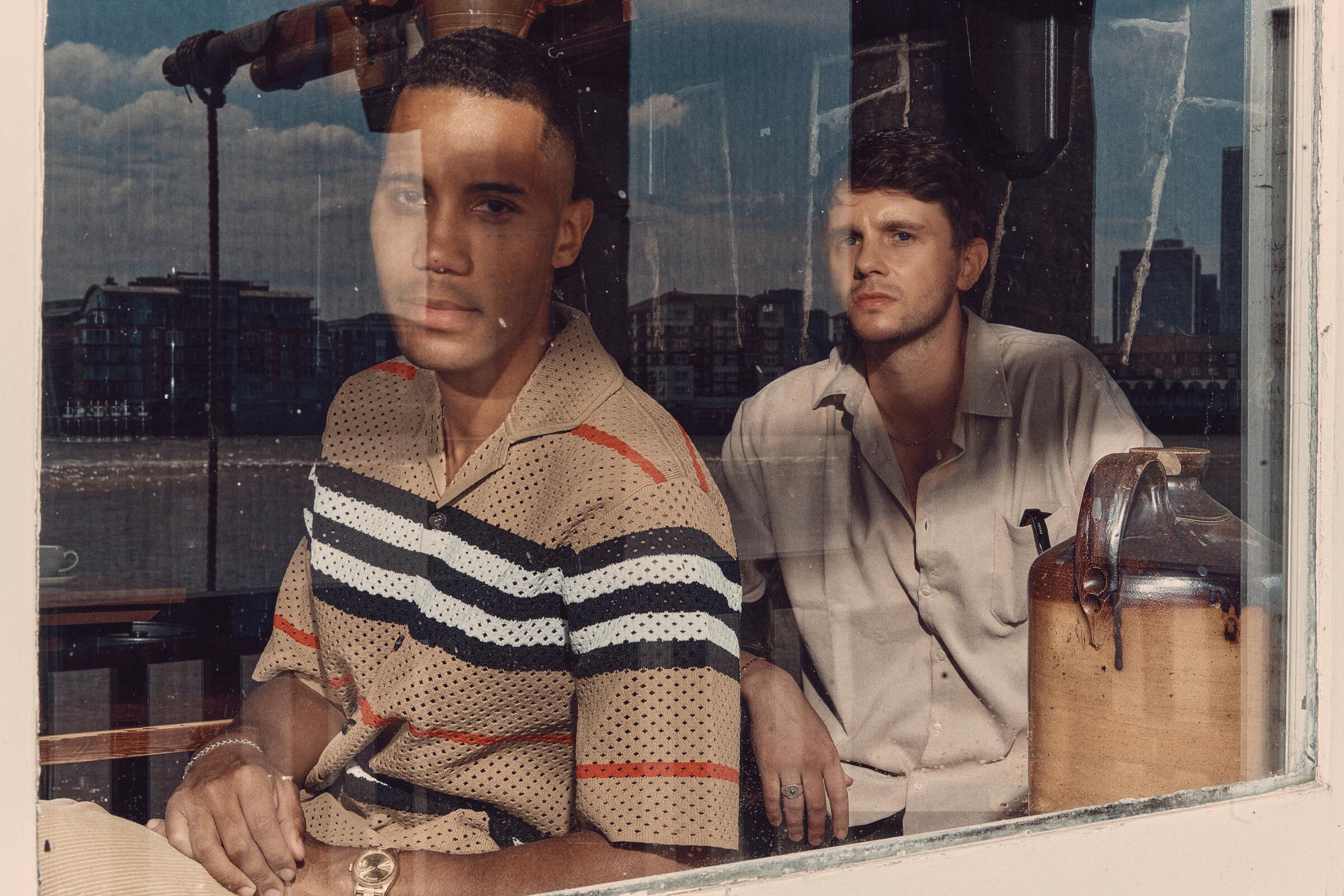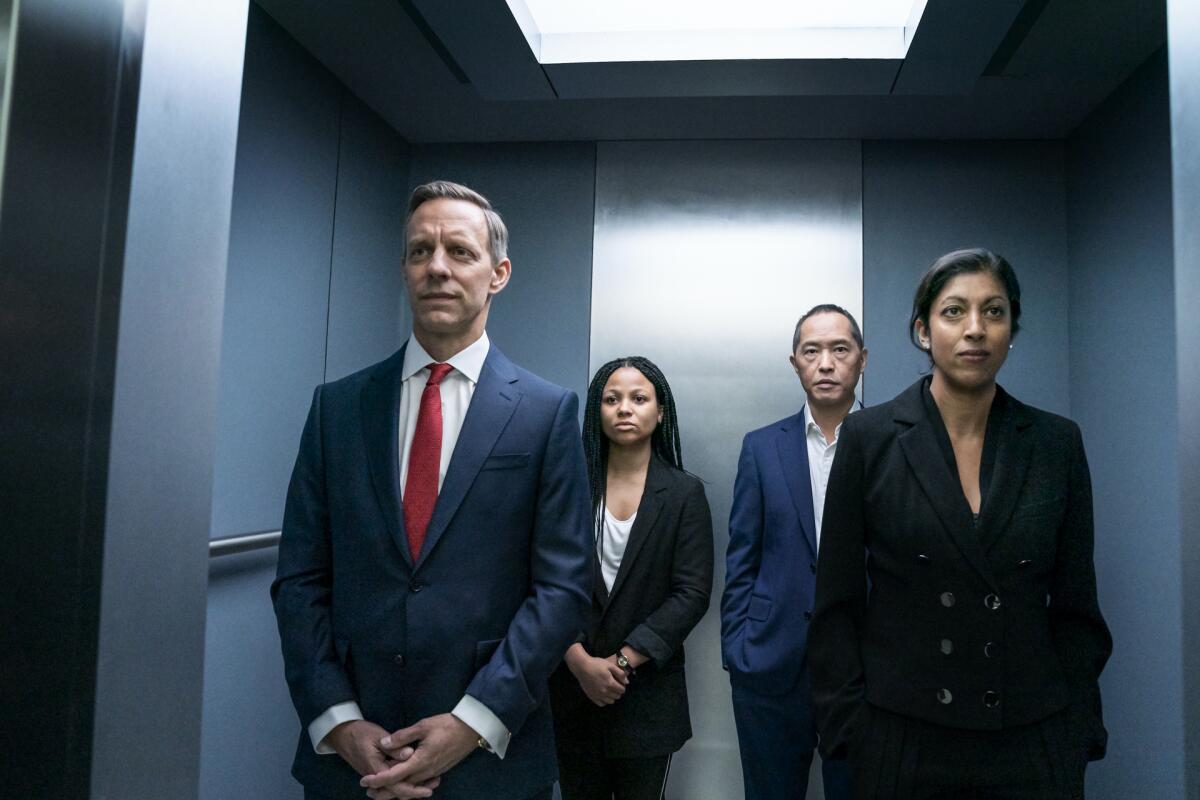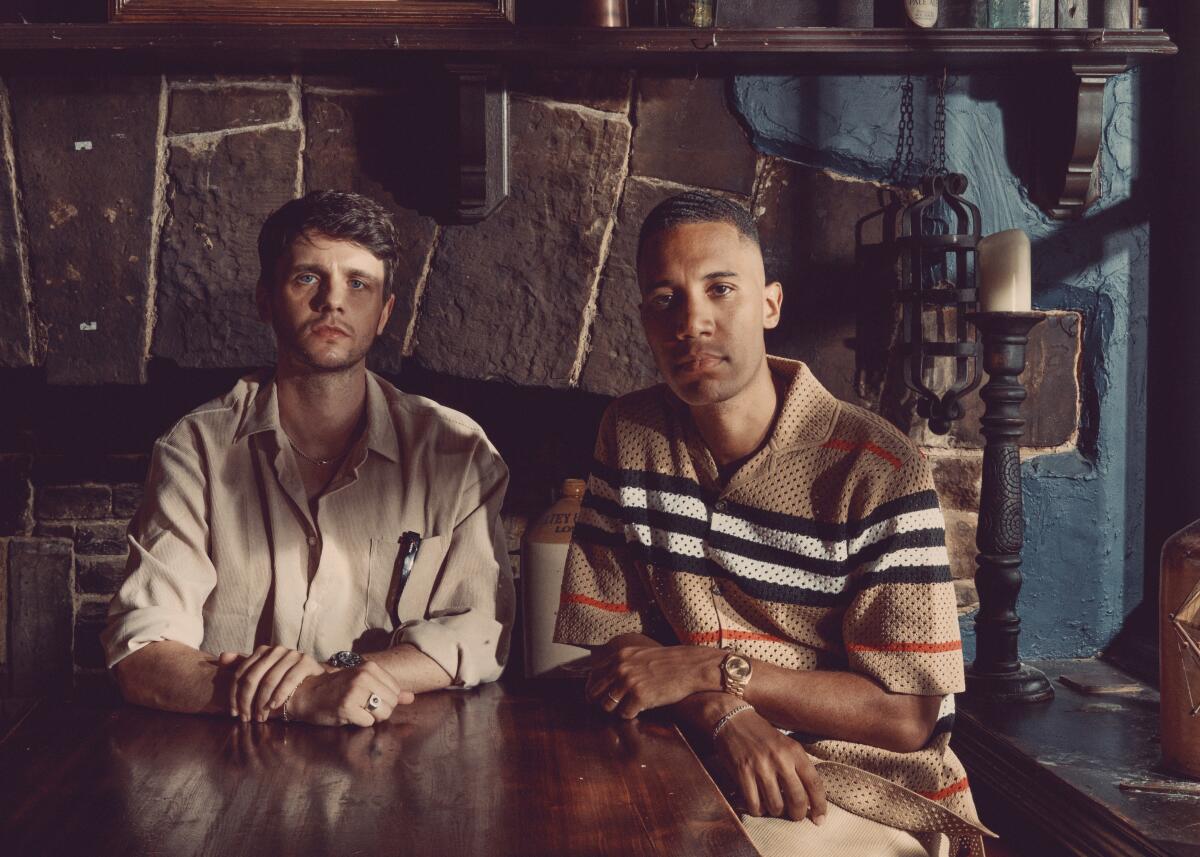The complete guide to home viewing
Get Screen Gab for everything about the TV shows and streaming movies everyone’s talking about.
You may occasionally receive promotional content from the Los Angeles Times.

LONDON — The drama of “Industry” may seem far-fetched, but HBO’s sophomore series — set in the City, London’s incarnation of Wall Street — reflects the real world of high-stakes international finance with an insider’s precision. After all, “Industry,” which drops viewers onto the trading floor of fictional investment bank Pierpoint & Co., where the employees backstab, snort coke and engage in sexual dalliances that make “Game of Thrones” look tame, comes from a place of personal experience: Creators Mickey Down and Konrad Kay had their own ill-fated careers at various London banks.
Previously, the pair had written and directed the 2014 dark comedy film “Gregor,” about a 20-something Londoner trying to figure out his life. But they wanted to create something more specific to their own lives in the City. The idea was to set the story in a familiar world but structure it from an unlikely point of view.
“We’re suckers for all the old literature and films set [in that world],” Down explains. “We think it’s a fascinating ecosystem. We thought, ‘Why isn’t there a modern version of this?’ But it was only when we started writing from the perspective of the people at the bottom that we thought, ‘OK, this actually has a lot to it.’ It’s allowed us to do what we wanted to do, which is an ambitious young person show set in London that’s [also] an inside baseball look at [an] industry we were comfortable writing.”
We surveyed The Times TV team to come up with a list of the 75 best TV shows you can watch on Max (formerly HBO Max). And yes, your disagreement is duly noted.
The first season, which premiered in November 2020, followed a group of recent university graduates working at Pierpoint, including talented New Yorker Harper Stern (Myha’la Herrold) and privileged Londoner Yasmin Kara-Hanani (Marisa Abela). As the characters struggled to prove their merit leading up to “RIF Day” (also known as “reduction in force”), where the higher-ups select the graduates who will get to continue their employment, the initial eight episodes threw viewers headlong into a fast-paced, highly specialized industry while retaining the interpersonal drama of a prime-time soap.
Season 2, which premieres Aug. 1, kicks off two years later, with an acknowledgment of the pandemic that avoids incorporating it too much into the narrative. The time jump allowed Down and Kay to introduce new storylines suited to seasoned professionals.
“We deliberately picked characters at the start of their careers, but it was really difficult [to give them] enough agency to make them compelling TV characters,” Kay reflects. “Because instead of leading the action, they were always having to report to people.… So Season 2 was really exciting for us because we’re like, ‘Oh, we can jump these people forward into that third year, and they’re going to become active characters immediately because they’re gonna have to pursue business.’”

Although “Industry” embraces high drama, Down and Kay aim to make it as realistic as possible. They have three consultants who are part of the writers room and the production process. The consultants check the dialogue and storylines for accuracy and ensure that what’s happening on “Industry” could happen in a present-day bank.
“Me and Konrad, we understand how these places work and the cadence of the dialogue — the soundscape and what it looks like and how people behave and their motivations,” Down says. “But we haven’t been in banking for a decade, so it was good to speak to people who were really in the trenches, from the top end and bottom end.”
The dialogue is especially tricky. There’s a specific rhythm to how people on a trading floor speak and abbreviations that exist only in that world. The creators and writers are aware that unless you have a background in finance, you probably won’t understand everything that’s being said in an episode of “Industry.” For Season 2, executive producer and writer Jami O’Brien helped to ensure there was enough exposition in each scene.
“Sometimes there’s a barrage of this really amazing, witty, smart finance language, and I would try to be like, ‘All right, but how can we land this?’” O’Brien explains. “I was a proxy for the audience and tried to help them shape it and help them say what they were trying to say.”
For the cast, learning how to speak correctly has been a real challenge, although it seems natural when you watch the series. Herrold, who knew nothing about finance prior to being cast, uses Investopedia to understand what certain slang means. The consultants also help the actors feel confident in what they’re talking about in particular scenes.
The complete guide to home viewing
Get Screen Gab for everything about the TV shows and streaming movies everyone’s talking about.
You may occasionally receive promotional content from the Los Angeles Times.
“Once you’ve got the rhythm of the language, the easiest way to make it seem and look realistic is to just spit the words out,” Herrold says. “Because these people know it like the back of their hand. They’re not stuttering, and they’re not tripping over themselves. The easiest way to make it feel natural is that it just spills out. So once you learn the words, you let them fall out of your mouth and then, suddenly, it looks like you know what you’re talking about.”
Still, the financial jargon is ultimately secondary to the emotional beats of the story, which are less about trading stocks and more about what it feels like to be navigating a difficult industry in your 20s.
“Even my close friends in the northwest of England watch the series and just love it, and they haven’t got a Scooby-Doo about foreign exchange,” says Chris Dunne, a former banker who is now one of the show’s consultants. “For them it’s more about the excitement of a trading floor. They don’t really feel the need to know the ins and outs of it. And that only plays a small part — you’ve got the sex and drugs, you’ve got the nightlife, you’ve got the interpersonal relationships.”
“I think what makes it accessible to people is that the show is not really about finance — finance is our context,” Herrold adds. “What the show is about is relationships. It’s about young people entering their dream career at the lowest level, at the bottom of the chain, with everything to prove and feeling like they have everything to lose and wanting to make a name for themselves in the business world.”

The sex and drugs, which are prolific, may be slightly exaggerated, although the creators and Dunne confirm that hookup culture and frequent cocaine use does occur in real-life banks. For Down and Kay, it’s about showing the extremes of what is possible.
“There are definitely people who are drug- and sex-obsessed in the City,” Down says. “Definitely. There are also very ‘boring’ family people who put their head down, are obsessed with their work and nerdy.… And the gap between men and women is shrinking, I think, but there’s still a colossal amount of testosterone-fueled, money-hungry men going into this job who are obsessed with status and clothes and holidays and all the things that you get into this job to get.”
“Does it happen? Yeah, I’m sure it does because you can’t stay up until 4 o’clock in the morning and then get up again and do a full day’s work,” Dunne adds. “You can’t do that without some sort of enhancement.”
Perhaps one of the most surprising details of the business that “Industry” gets right is its diversity. The cast of characters is led by Harper, a Black woman, and her colleagues come from a variety of cultural backgrounds; her boss on the Cross Product Sales desk, Eric Tao (Ken Leung), is an Asian American man. While the common perception of Wall Street or the City is that they’re composed of older white men, “Industry” is a more realistic onscreen portrayal.
‘This Is Going to Hurt’ created TV’s most accurate portrayal of childbirth — and its ‘sticky, sweaty, bloody’ vision could change the conversation.
“There’s such a lack of representation in the media of finance, but finance is actually an incredibly diverse industry,” Herrold says. “They get people from literally all over the place. Maybe the highest of higher-ups are still the picture that we’re picturing, but [the banks] are that diverse because they do really get the smartest people from all over the place. True, a lot of them are still trust-fund kids and people who went to Oxford or Harvard or whatever. But it is an incredibly diverse industry, which was one of the most interesting things that I learned. It makes sense because across the board, people love money.”
That obsession with money and power is the beating heart of “Industry,” which is careful not to paint investment bankers with too broad a brush. Fans have a love-hate relationship with many of the characters, who wrestle with complex moral issues, especially in Season 2. The creators aren’t sure if it’s a compliment when they hear about young people going into finance after seeing “Industry,” but they recognize why it seems compelling.
“It’s still a very sexy and alluring world,” Kay says. “But we want to put the morality question out there a little bit more strongly. We really tried to write about systems of power, especially in the U.K. There’s a whole strand of the story about British public schools, i.e., places like Eton, and how they funnel people through to Oxbridge or Ivy League schools and how those people end up on trading floors. And how that goes all the way up to the top of government, especially the Conservative government in the U.K. How that feedback loop of power is very difficult to break.”
At its core, “Industry” asks questions about what someone is willing to compromise in order to succeed.
“I love the idea — and this is something we started with in Season 1 — that people will make up their own mind about it,” Down says. “I never want it to feel didactic.… Hopefully, [in Season 2,] the questions are clearer, the choices are slightly clearer, but the reasoning behind the choices is just as complicated.”
The complete guide to home viewing
Get Screen Gab for everything about the TV shows and streaming movies everyone’s talking about.
You may occasionally receive promotional content from the Los Angeles Times.